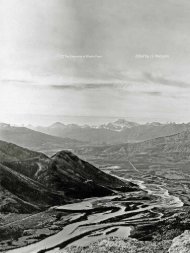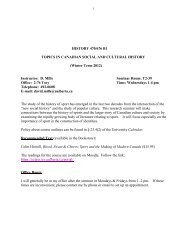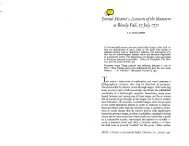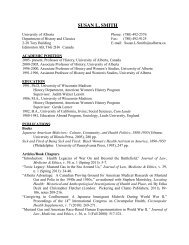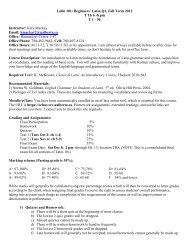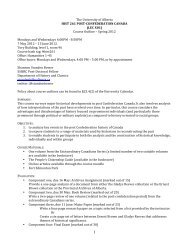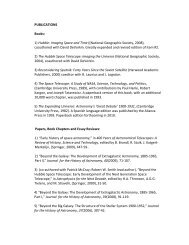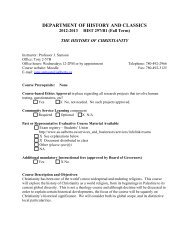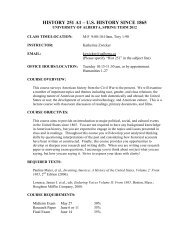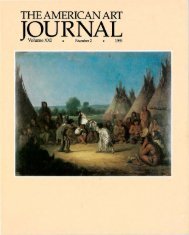- Page 1 and 2:
&I,",,~C Ihe Ladies c cu. V'VVAN[s.
- Page 4:
This page intentionally left blank
- Page 8:
Published byThe University of Alber
- Page 12:
For Margaret
- Page 16:
VIIITHE LADIES, THE GWICH'IN, AND T
- Page 20:
XTHE LADIES, THE GWICH'IN, AND THE
- Page 24:
This page intentionally left blank
- Page 28:
XIVTHE LADIES, THE GWICH'IN, AND TH
- Page 32:
XVITHE LADIES, THE GWICH'IN, AND TH
- Page 36:
XVIIITHE LADIES, THE GWICH'IN, AND
- Page 40:
XXTHE LADIES, THE GWICH'IN, AND THE
- Page 44:
XXIITHE LADIES, THE GWICH'IN, AND T
- Page 48:
XXIVTHE LADIES, THE GWIGH'IN, AND T
- Page 52:
XXVITHE LADIES, THE GWICH'IN, AND T
- Page 56:
XXVIIITHE LADIES, THE GWICH'IN, AND
- Page 60:
XXXTHE LADIES, THE GWICH'IN, AND TH
- Page 64:
XXXIITHE LADIES, THE GWICH'IN, AND
- Page 68:
XXXIVTHE LADIES, THE GWICH'IN, AND
- Page 72:
XXXVITHE LADIES, THE GWICH'IN, AND
- Page 76:
XXXVIIITHE LADIES, THE GWICH'IN, AN
- Page 80:
XLTHE LADIES, THE GWICH'IN, AND THE
- Page 84:
XUITHE LADIES, THE GWIGH'IN. AND TH
- Page 88:
XLIVTHE LADIES, THE GWICH'IN, AND T
- Page 92:
XLVITHE LADIES, THE GWICH'IN, AND T
- Page 96:
XLVIIITHE LADIES, THE GWICH'IN, AND
- Page 100:
LTHE LADIES, THE GWICH'IN, AND THE
- Page 106:
~ ContentsIDreaming of the Journey2
- Page 110:
In 1913 a school-friend of mine wen
- Page 114:
DreamingoftheJoumry 3Such is the tr
- Page 118:
5~ * PlantheSo there we were throug
- Page 122:
We Plan theJournry 7and then only f
- Page 126:
WePlan theJoumry 9the wing" or "bet
- Page 130:
II(3 Southam tonto EdmontonDiary. M
- Page 134:
Southampton to Edmonton 13our eyes.
- Page 138:
Southampton to Edmonton 15memory bu
- Page 142:
(4 OutWe nee de d all 0 U r wit s a
- Page 146:
Outfitting in Edmonton 19H.A. 0 (Ha
- Page 150:
Outfitting In Edmonton 21North Sask
- Page 154:
23(5 Lure 0the NorthDuring the jour
- Page 158:
Lure of the North 25as the Indian t
- Page 162:
Lure of the North '2, 7Slowly the s
- Page 166:
29(Ei_D~a~s ____ ~ ____ ~AshoreWe 0
- Page 170:
D.rysAshore 31Long after midnight w
- Page 174:
D'OY,Ashore 33this calendar.' 'God
- Page 178:
DcrysAshore 35to several, including
- Page 182:
37Great SlaveLakeIt was 9 in the ev
- Page 186:
Great Slave Lake 39preparation, dis
- Page 190:
41(8 In and OutThe leisured tourist
- Page 194:
In and Out 43meet one ordinary pers
- Page 198:
In and Out 45light that may be sky
- Page 202:
47(9 From Providenceto AklavikProvi
- Page 206:
From Providence to Aklavik 49We awo
- Page 210:
From Providence to AklQvik 51excite
- Page 214:
5300 Eskimosat AklavikAs we drew in
- Page 218:
Eskimos at Aklavik 55Roman Gatholic
- Page 222:
Eskimos at AHavik 57Lazarus Sittich
- Page 226:
Eskimos at Aklavik 59Trial oflkagen
- Page 230:
Eskimos at Aklavik 61Drums used at
- Page 234:
Eskimos at Aklavik 63feelings consi
- Page 238:
~ Harbour 0--------------------~~--
- Page 242:
Harbour of Wrecked Men 67neighbours
- Page 246:
~ La Pierre HouseThe doctor's verdi
- Page 250:
In Pierre House7I"Where is the next
- Page 254:
to Pierre House 73ourselves. I was
- Page 258:
La Pierre House 75numbers of white
- Page 262:
77~ The UnrelentiNorthIn the middle
- Page 266:
The Unrelenting North 79"My dad," h
- Page 270:
The Unrelenting North8rmedicine, so
- Page 274:
The Unrelenting North 83chance to f
- Page 278:
c;4 Two Idle~eksCaptain Cameron was
- Page 282:
Two Idle Week.< 87Grt!y Nuns' Missi
- Page 286:
Two Idle Weeks 89Inuit b?y, his mot
- Page 290:
Two Idle Weeks 91All this was but p
- Page 294:
Two Idl, Week, 93Interior of All Sa
- Page 298:
95(r5 Prelude toAdventureA t I a s
- Page 302: PreludetoAdv,nture 97brothers to wa
- Page 306: Prelude to Adventure 99Beginning of
- Page 310: 101(tii Check to ourPro essThat nig
- Page 314: Check to our Progress 103jim Koe di
- Page 318: Check to our Progress 105our sleepi
- Page 322: 107(ri Moods Ra idsand IslandsThe a
- Page 326: Moods. Rapids and Islands 109Jim Ko
- Page 330: Moods, Rapidsond [slandsIIIThe afte
- Page 334: Moods, Rapids and IslandsII3was lim
- Page 338: lISG8 To Barrier RiverAft era 11 th
- Page 342: To Barrier River II 7mud dropped sh
- Page 346: To Ba rrier RiverII9La;:arus Sittic
- Page 350: I2I(r; A TumiPointWe slept on sand
- Page 356: 124 THE LADIES, THE GWICH'IN, AND T
- Page 360: This page intentionally left blank
- Page 364: 128 THE LADIES, THE GWICH'IN, AND T
- Page 368: 130 THE LADIES, THE GWICH'IN, AND T
- Page 372: This page intentionally left blank
- Page 376: 134 THE LADIES, THE GWICH'IN, AND T
- Page 380: I36THE LADIES, THE GWICH'IN, AND TH
- Page 384: This page intentionally left blank
- Page 388: 140 THE LADIES , THE G WI C H'I N,
- Page 392: 142 THE LADIES, THE GWICH'IN, AND T
- Page 396: This page intentionally left blank
- Page 400: 146 THE LADIES, THE G WI C H' I N,
- Page 404:
148 THE LADIES, THE GWICH'IN, AND T
- Page 408:
ISOTHE LADIES, THE GWICH'IN, AND TH
- Page 412:
This page intentionally left blank
- Page 416:
154 THE LADIES, THE GWICH'IN, AND T
- Page 420:
156 THE LADIES, THE GWICH'IN, AND T
- Page 424:
158 THE LADIES , THE GWICH'IN , AND
- Page 428:
I60THE LADIES, THE GWICH'IN, AND TH
- Page 432:
62THE LADIES, THE GWICH'IN, AND THE
- Page 436:
164 THE LADIES, THE GWICH'IN, AND T
- Page 440:
166 THE LADIES, THE GWICH'IN, AND T
- Page 444:
168 THE LADIES, THE GWICH'IN, AND T
- Page 448:
I70THE LADIES, THE GWICH'IN, AND TH
- Page 452:
172 THE LADIES, THE GWICH'IN, AND T
- Page 456:
This page intentionally left blank
- Page 460:
176 THE LADIES, THE GWICH'IN, AND T
- Page 464:
I78THE LADIES, THE GWICH'IN, AND TH
- Page 468:
180 THE LADIES, THE GWICH'IN, AND T
- Page 472:
82THE LADIES, THE GWICH'IN, AND THE
- Page 476:
184 THE LADIES, THE GWICH'IN, AND T
- Page 480:
86THE LADIES, THE G WlCH ' IN, AND
- Page 484:
This page intentionally left blank
- Page 488:
190 THE LADIES, THE GWICH'IN, AND T
- Page 492:
192 THE LADIES, THE GWICH'IN, A ND
- Page 496:
194 THE LADIES, THE GWICH'IN, AND T
- Page 500:
196 THE LADIES, THE GWICH'IN, AND T
- Page 504:
198 Appendix 1doctor." Vyvyan attem
- Page 508:
200 Appendix 1another medical farce
- Page 512:
202 Appendix 1have 2 or 3 days to w
- Page 516:
IW4 Appendix 1winding: then winds a
- Page 520:
206 Appendix 1SATURDAY 12 JUNESun'!
- Page 524:
208 Appendix 1wood pile at breakfas
- Page 528:
210 Appendix 1cramp his style + I w
- Page 532:
2 I 2 Appendir 1TUESDAY 6 JULYI bak
- Page 536:
flowers beds of Lin no eo + O:gcocc
- Page 540:
2 I 6 Appendix 1more Red throated L
- Page 544:
218 Appendix 1TUESDAY 20 JULYI writ
- Page 548:
220 Appendix 1spruce trees grows on
- Page 552:
2 2 2 Appendix 1lies in bed. deep p
- Page 556:
ZZ4 Appendix 1WEDNESDAY 11 AUGUSTOv
- Page 560:
226 Appendix 1Books read May-Oct. 1
- Page 564:
228 Appendix 1R'way Tickets SewardN
- Page 568:
This page intentionally left blank
- Page 572:
232 Appendix 219 I1wlictrumdioicum
- Page 576:
234 Appendix 2North of Fort N orIIl
- Page 580:
236 Appendix 2188b Orytropis lamber
- Page 584:
This page intentionally left blank
- Page 588:
240 Notes to Pages 6-7district 1908
- Page 592:
242 NotestoPage 17before freeze-up
- Page 596:
244 Notes to Pages 22-23,201efforts
- Page 600:
246 Notes to Pages 23-25Fort McMurr
- Page 604:
248 Notes to Poges 29-30McKenzie. c
- Page 608:
250 Notes to Page 31we had supper a
- Page 612:
252 Notes to Pages 35, 204-206smoot
- Page 616:
254 NotestoPagesfl-f4:community tha
- Page 620:
256 Notes to Pages 47-49CHAPTER 9:
- Page 624:
~58 Notes to Poges 52,207top "). Th
- Page 628:
260 Notes to Pages 53-58(Herschel I
- Page 632:
262 Notes to Pages 60-62Interpreter
- Page 636:
264 Notes to Pages 63-67, :109Fanni
- Page 640:
266 Notes to Pages 73-77.210Aklavik
- Page 644:
268 Notes to Poges 79-86exclusivene
- Page 648:
'2.70 Notes to Pages 93-94, 211theJ
- Page 652:
272 Notes to Pages 95-99strapped in
- Page 656:
274 Notes to Pages 101-111,212Field
- Page 660:
276 Notes to Pages 131-139usually a
- Page 664:
278 Notes to Pages 139-151Territori
- Page 668:
280 Notes to Pages 153-158"A young
- Page 672:
282 Notes to Poges 160-165, 218rect
- Page 676:
284 Notes to Pages 170-173The docto
- Page 680:
286 Notes to Pages 177-187,222-223P
- Page 684:
This page intentionally left blank
- Page 688:
290 References"List ofN. American p
- Page 692:
Z9ZReferencesDorrien Smith, Gwendol
- Page 696:
294 ReferencesKelcey, Barbara Eilee
- Page 700:
296 ReferencesOn the Banks of the S
- Page 704:
298 References"Vale, AlfredJames."
- Page 708:
300 IndexBack, George, 251Baillie I
- Page 712:
302 IndexDepartment of the Interior
- Page 716:
304 IndexSt Patrick's Mission, 246H
- Page 720:
306 IndexMackenzie Delta, 8, 24, 25
- Page 724:
308 IndexRamparts (Yukon River). ~~
- Page 728:
310 IndexTizya.John.278Tizya.John R





